Spirit Possession in Dragon Ball
Would you be willing to trade your soul to achieve worldly desires, or in exchange for more power? What about allowing your body to be controlled by God, or a demon?
In Dragon Ball, Akira Toriyama incorporates spirit possession as a way to propel character development and plot.
This article explores how Toriyama was inspired by ancient belief systems and spirit possession traditions.
What is Spirit Possession?
Wikipedia defines spirit possession as “A paranormal or supernatural event in which it is said that spirits, gods, demons, animas, extraterrestrials, or other disincarnate or extraterrestrial entities take control of a human body, resulting in noticeable changes in health and behavior.”
In eastern Buddhism, Daoism, Korean Shamanism, Shinto and Japanese new age movements, spirit possession can also include the summoning of a spirit into an inanimate object, such as a sword, medallion or statue. In Japan, Shinto priests imbued samurai swords with foreign spirits (called Kami, 神) to increase their battle power or provide otherworldly protection.
In Dragon Ball Z we have many cases of spirits entering or being forced into inanimate objects. For example, using the Mafuba technique to seal a demon in the Denshi Jar; Tapion playing his ocarina to seal Hildegarn in the music box; and Rou Dai Kaioshin being trapped inside the Z Sword for millions of years, only being set free after the blade broke.
But in this article we’re going to focus on the spirit possession that affects people who are controlled by a foreign spirit unwillingly, or willingly ask a foreign spirit to control them in exchange for something else.
The History of Spirit Possession in Asia
Spirit possession is found in many world cultures, including Christianity. But the majority of Dragon Ball’s inspiration stems from East Asian belief systems, including from India, China and Japan.
The Anunka warriors of ancient India purposefully sought spirit possession to gain greater power. They would chant, enter into a trance, and plead foreign spirits to attach themselves to their bodies or take over their minds. In this manner they were said to become super strong in battle, going far beyond the limits of normal men.
The martial arts practices and religions of India were the precursors to many of the Chinese belief systems. They were inherited by the Chinese through the Ksatreya style of martial arts, and Buddhist and Brahmin systems.
Around 475 BC in Northeastern China there was a group known as the Fang Shi (Esoteric Magic Masters, 方士) who practiced shamanistic spirit possession. They were somewhat of a pre Daoist religious group of ascetics, with beliefs in the Five Elements, a Supreme Ultimate (Tai Ji), exorcisms, divination and alchemical immortality.
Primarily consisting of hermits and wanderers, the Fang Shi used magic arts to seek everlasting life, summon demons or spirits, predict the future and gain supernormal powers.
Considered technicians of magic, their practice grew in popularity and even courtroom influence until the government considered it a dangerous cult and outlawed it, ending the practice in approximately 569 AD.
The belief systems and physical practices of the Fang Shi were inherited by the Daoists, whom, in some of their organized forms, would become the literati immortality cults of China. The Daoists attempted to turn ignoble metals into gold, create immortality elixirs, give birth to ephemeral dragons in their own bodies, communicate with spirits in other dimensions and gain everlasting life through physical exercises.
Across centuries the Daoist and Buddhist martial arts became interwoven with the beliefs of the immortality cults, which then became replaced with elite sectarian religions and the continuation of earlier practices, such as shamanistic rituals.
The Fang Shi “magicians” were the precursors to many of the Daoist and Buddhist magical abilities and rituals of common belief. These became the sources of myths and legends which would find their way into novels like Journey to the West and Great Water Margin.
Dragon Ball is directly inspired by these epic stories, and so we also find them in Dragon Ball.
Virtue and Vice
There have been many different cultivation practices throughout history. Some practices teach honesty, compassion and the letting go of desires, while others promote greed, power and the satisfaction of worldly desires. Some are freed by virtue, while others are controlled by vice.
But no matter the principles, at some point a teacher needs to find a disciple.
In ancient China there was a phrase attributed to Daoism that says, “The master looks for a disciple, not the disciple looks for a master.”
It implies that when the time is right, the master looks for a particular quality within a person to see if they would be a good fit to inherit their practice. In the case of the Daoists, what they were looking for was virtue (Chinese: De, 德).
They had to find somebody with high level inborn quality and a large amount of virtue attached to their spirit. With that, the disciple would have an easier time enlightening, and their cultivation practice would meet with success. Without it, the practice would be very difficult and they may fail.
But masters of unrighteous practices sought just the opposite. They looked for disciples with wicked hearts and selfish minds. They wanted people who desired self validation and externalities.
In other words, those with weak hearts; something the Chinese referred to as “e” and the Japanese as Aku (悪).
In addition to the master seeking a disciple, there are sacred possessions and demonic possessions aligned with a person’s level of character.
In religious systems across the world, such as Christianity and Buddhism, it’s taught that exceptionally good people who are aligned with virtue can have their bodies possessed by ‘angelic’ life forms. They are used by heavenly forces to transmit the holy Law, complete important missions or physically receive marks, such as stigmata, as manifest proof of divinity. Their bodies are taken control of, they receive genius inspiration or they are guided along a fortuitous path to do sacred things.
Similarly, those who seek to achieve worldly desires and perform evil acts are essentially inviting things such as foxes, snakes, demons and ghosts, low level spirits, onto themselves. Because their thinking is the same as these creatures, their weak minds are pushed aside and their bodies are possessed.
So let’s take a look at these two different scenarios. One good. One evil.
First the good.
Kami and Shen
In Dragon Ball episode 139, Piccolo has entered the 23rd Tenkaichi Budokai to fight and kill Goku.
Kami also enters the tournament so that he can confront Piccolo and defeat him. But he does not do so directly. Instead, he tries to surprise Piccolo by possessing the body of a human being as a disguise.
He chooses a man with the ring name of Shen (シェン), called Hero in the FUNimation dub. Shen is a homonym for Shen (神), an originally Chinese word meaning God, Divine, and Holy, but Shen’s name is written in Katakana instead of Kanji.
Shen is a nerdy, skinny middle-aged man who does not seem like the best choice for a martial arts tournament. Kami said in a later episode that he chose Shen because of his good nature.
Yamcha fights against Shen in the semi-finals and they have a conversation.
Shen says, “This is just between you and me, but I’m not really human.”
Yamcha laughs and dismisses the comment. “Don’t tell me you’re some sort of space alien or something.”
“Maybe, maybe not. All I can tell you is that I’ve borrowed this person’s body for a little while. Simply put, I’ve transferred my spirit into this body.”
What’s funny is that Kami actually is a space alien, but this hasn’t been revealed yet in the series.
Shen defeats Yamcha after a dramatic twist, and Goku realizes that Shen and Kami are the same person.
Goku thinks to himself, “Competitor Shen… Shen… Shen Long… Shen! That’s it! That middle aged man is actually Kami-Sama!”
While Shen and Yamcha are recovering from the match, Shen realizes there is blood on his chin. “Oh my, I’ve gone and injured my host body.”
With blood also running down his chin, but a smile on his face, Yamcha says, “I never had a chance of winning against someone who could take a direct hit from my Soukidan.”
Shen was able to survive Yamcha’s most powerful Ki attack, despite the fact that Shen was a weak, untrained, skinny middle-aged man completely unfit for the Tenkaichi Budokai.
Shen seemingly had all of the powers and abilities of Kami. This implies that it’s not the body that matters most; it’s the spirit that controls it.
Piccolo and Kami
In Dragon Ball episode 142, Kami, inside the body of Shen, faces off against Piccolo.
Shen attempts to use the Mafuba (魔封波) technique against Piccolo, sealing him in the jar for eternity.
Piccolo realizes Kami is in control of the body. He screams, “Kami, what are you doing in the Lower Realm?!”
Piccolo figures out how to win, and the Mafuba technique doesn’t work because he reverses it against Kami!
Trapped inside the Mafuba’s wave, Kami screams, “Dammit, it wasn’t supposed to turn out like this. At least let this human body go!”
And then the human body drops away and Kami’s true form appears inside the Mafuba’s spiral.
Piccolo, with great satisfaction, traps him inside the jar.
Shen’s body lay on the battle stage, and Piccolo Daimao holds the Mafuba jar in his hand that contains his former self and counterpart, Kami.
Piccolo’s father, Piccolo Daimao, the Demon King, had once been sealed in the Mafuba jar before, and he grew old and weary while inside. Now Piccolo Daimao Jr. had enacted his revenge.
In Dragon Ball episode 143, Piccolo laughs, “I’ve sealed Kami-sama, who had taken control of his body, inside this!”
Shen fails to get up during the 10 count, and Piccolo wins the match.
The announcer runs over to Shen to see if he’s okay. He says, “Shen-san! Shen-san!”
Shen wakes up, blinking his eyes in total confusion. He looks around, puzzled at what’s going on. The crowd cheers for him because of his performance up to that point of the Semi-Finals.
He asks the Announcer, “Um, this wouldn’t be where they’re holding the Tenkaichi Budokai, would it?”
“Eh? Yes, that’s right. Did you happen to hit your head or something?”
Shen looks around at Piccolo, Goku and the others, and is completely baffled. “Ah, silly me!” Then he embarrassingly runs off the stage.
He says to himself, “How strange. When did I get up there? Did I have a couple drinks or something?”
Then Shen’s son comes out from the crowd. “Daddy! I never knew you were so strong, Daddy!”
Shen had absolutely no recollection of the event, and his conscious mind had been completely repressed by Kami’s presence.
Kami took control of a human’s body and did what he felt was necessary for the greater good of mankind, fulfilling his role as Guardian of earth in a way that is very similar to the role of deities in traditional culture: Indirectly, and through the body of a human.
Now let’s take a look at an evil example of spirit possession in Dragon Ball.
The Majin
Much later in the series, in episode 228 of Dragon Ball Z, a higher level deity named Kaioshin has descended to earth in order to defeat the evil sorcerer, Madoshi Babidi.
Madoshi Babidi has the ability to possess the hearts of wicked men. The more evil their hearts, the easier it is to control them.
The beings Babidi possesses gain superhuman strength. Some are filled with intense anger and lose control of their personalities. They become maniacal slaves that are not only more malicious, but also seemingly invincible and impervious to pain.
In the 25th Tenkaichi Budokai, two fighters named Spopovich and Yamu willingly allow themselves to be possessed by Babidi in exchange for more power.
Like the superhuman warriors possessed by foreign powers in the ancient legends, they have become fearful, almost unstoppable warriors. They violently fight their way up the tournament ladder.
When Videl (Gohan’s girlfriend) fights back against Spopovich’s endless assault, she kicks him in the head and breaks his neck. But he simply twists his head back into place and continues the fight, beating her to the brink of death.
Majin (魔人) is a label in Dragon Ball given to anybody that is possessed in such a manner. You can tell they are possessed because they have the mark of the Majin “M” on their foreheads or elsewhere on the body.
In colloquial Japanese, Ma (魔) has come to mean magic, or enchanted, while Jin (人) means man, or being, so Majin is commonly translated as “magical being.” In some ways this makes sense, but this is a shallow understanding of the original Kanji.
Likewise, Madoshi (魔道師) is a word that is often translated shallowly as Magician.
Ma (魔) means demon, evil spirit, witch, or describes an evil influence, power, enchantment or ability.
Do (道) is the Japanese pronunciation of Dao. It means the way, path, school, or practice, and is the same Dao from Daoism.
Shi (師) means teacher, master, or expert.
When put together, Madoshi means “Demon Way Master,” or “Master of the Demonic Way.”
So you can see that Madoshi Babidi is much more than a simple magician. He’s a genuine master of the dark arts. Similarly, a Majin is more than just enchanted. They are demons.
The Kanji for Ma (魔) suggests that all beings given this label are the antithesis of upright beings, driven to threaten humanity or overthrow the heavens.
In fact, Madoshi Babidi is the son of Madoshi Bibidi, an evil sorcerer who once did battle against the Kaioshin’s (界王神), the deities of the Dragon Ball cosmos.
In order to fight the gods, Madoshi Bibidi conjured up an evil demon that he named Majin Buu (魔人ブウ).
Buu (ブウ), written in Katakana, is also a homonym for Bu (武), meaning martial arts, warrior, war, or martial. Majin Buu thus essentially means “Demonic Being of War.”
Then why is it written as Buu instead of Bu? Because humorously, their names together are Bibidi, Babidi, Buu. This is the same magic incantation used by the Fairy God Mother in Disney’s Cinderella (1950), and is also called “The Magic Song.” Toriyama used it here as a verbal joke. Wikipedia states that “Most Japanese merchandise spells Buu’s name in the proper “Boo,” just like the song.”
Madoshi Babidi seeks to awaken Majin Buu from the egg-like cocoon he was sealed inside by the surviving Kaioshin’s, ages ago. Like Piccolo Daimao, this great evil had been sealed away.
Realizing the threat this poses to humanity, Kaioshin arrives on earth. One planet out of the countless he oversees.
Kaioshin meets with and convinces Goku, Gohan, and Vegeta to attack Babidi’s ship. He wants to destroy Babidi and his spirit possessed slave, Dabura, the King of Demons, before they can awaken Majin Buu.
Dabura is the King of the Demon Realm (Japanese: Makai, 魔界), a world in an inverse dimension to that of earth, where everything is dark, evil and populated by demons. Babidi is an incredibly powerful sorcerer to have been able to possess Dabura. Toriyama named Dabura after the second half of the magical incantation, “Abracadabra.”
Dabura fights against Gohan and in the midst of battle witnesses a moment of impatience and anger in Vegeta, who tires of their drawn out conflict and is disappointed by Gohan’s relative weakness after the 5 years of peace following the Cell Games.
Dabura immediately withdraws from the battle, saying, “I myself do not need to fight. I’ve found a good warrior [to do so for me].”
Babidi and Vegeta
Vegeta is frustrated and wants to end this stupid adventure so he can finally challenge Goku in a fight. He decides he’s going to blast a hole through Babidi’s spaceship, straight down to the lowest level.
Kaioshin stops him, shouting, “If you do such a thing, Majin Buu will be revived! Majin Buu is a monster who does nothing but create destruction and slaughter again and again. He is quite literally a demonic being, as four of the Kaioshin were no match for him! If Majin Buu is revived, then mankind… no, all living things will be put to death, and the earth will unmistakably be turned into a planet of death.”
Just as Kami sensed the goodness in the heart of Shen, Dabura senses the evil in Vegeta’s heart. He advises Babidi to attempt spirit possession on Vegeta.
Goku and Gohan were untouchable, but Vegeta’s impatience and tolerance hinted at flaws in his character.
Babidi looks at Vegeta through his crystal ball, talking to Dabura. “You’re right, he’s different from the others. It’s just as you said. His heart is filled with wickedness. He hasn’t come here for any just cause at all!”
Babidi casts his spell, saying “We’re going to have you serve us.”
Vegeta’s head is filled with pain. He writhes in agony as Babidi fights for control of his body.
Kaioshin tells Vegeta, “Babidi is attempting to use the evil in your heart! That’s right! Madoshi Babidi can manipulate the evil-hearted at will!”
He advises Vegeta, “Vegeta-san, empty your mind! You must not think of anything!”
Perhaps if Vegeta could, at that moment, empty his mind and become peaceful, there would be nothing for Babidi to latch onto. No attachments. No gaps.
Babidi gleefully continues, “All right, while we’re at it, let’s also draw out his hidden power, beyond his limits!”
Vegeta floats into the air, screams in anguish, and red lightning bolts arc throughout the room. The power of his energy causes a small earthquake in the surrounding cliffs around the ship.
Goku shouts, “What a Ki! I can’t get near it!”
The light recedes. Vegeta falls to the floor, crashing to his knees.
A moment of pause.
Vegeta slowly rises, with a Majin M on his forehead and a wicked grin on his face.
Majin Vegeta
Babidi successfully possessed Vegeta.
He chants an incantation, “Papparapa!” and they are transported to a new battleground: the Tenkaichi Budokai stage. Babidi and Dabura want Vegeta to fight against Goku and Gohan so that they can collect the dispersed energy from their battle and use it to awaken Majin Buu from his slumber.
Babidi tries to control Vegeta, telling him to battle and “even kill the others, if you like.”
“Silence!” Vegeta shouts. “My only objective is Kakkarot! I don’t care about anyone else!”
Babidi is in shock. “What a guy! He still isn’t completely under my control. This is a first.”
After calling Goku out in a challenge, Vegeta fires a Ki blast directly into Goku’s face, which Goku blocks, but he cannot redirect the beam. It flies into the crowd, killing over a hundred people immediately. Then the beam flies through the arena wall, burning through the city for more than a mile, finally erupting in a giant mushroom cloud.
Total death count? According to Babidi, 200 people.
Goku realizes what’s going on. “Vegeta! Don’t tell me you fell under Babidi’s spell on purpose. … Answer me, Vegeta!!”
Vegeta fires another blast into the stadium, killing dozens more. He then grimaces at Goku like a psychopathic madman.
Goku fills himself with rage and transforms into a Super Saiyan.
Goku says, “Vegeta. You let yourself fall under Babidi’s spell and lost your self-control, and did all this in order to get me serious? Am I wrong?”
Vegeta replies, “If I hadn’t done all this, you wouldn’t have fought me! In only one day, you’ll disappear from this world. And yet all this gets in the way!”
Kaioshin rebukes him, “So for that… just for that, you’ve done this foolish thing?”
Vegeta is insulted and shocked. “Foolish thing?! FOOLISH THING, YOU SAY?!!”
He powers up, sending dust everywhere.
“This is everything to me! It does not matter to me what happens with Majin Buu or anything else!”
Pointing at Goku, “He… He surpassed my strength! He is a Saiyan, same as me, yet he outpaced me! Me! The Prince, at the height of his overwhelming power! I… I’ve even had my life saved by him! I cannot forgive him for that! Absolutely not!!”
At the request of Goku they are transported by Babidi to a desert battleground away from civilians. Babidi tries to control Vegeta again, ordering him to kill everyone.
Vegeta’s mind is split in two and he writhes in pain. “Do it! Do them in!” The Majin symbol on his forehead pulses with red light.
“I refuse!”
Babidi orders him to do it once more, and Vegeta’s body spasms in pain.
Vegeta speaks to Babidi, “Like I said, all I want to do is fight Kakkarot. I… I am the proud Prince of the Saiyans! You think I would allow myself to become your serf?! You may control my body and my heart, but at least you will not have your way… with my PRIDE!!”
Vegeta screams in anger, powering up, sending a huge golden aura out of his body, while lines of white serpentine energy course out of him. Mountains collapse as the earth quakes.
Kaioshin is in shock, “Unbelievable! To think there’s a person that could defy Babidi while being controlled by him!”
Goku, almost in disgust, says, “So this is how badly you wanted to settle things between us, Vegeta?”
“I’ve waited. I’ve waited so long, Kakkarot!”
The Pride of a Man
In this scenario we see the extent to which Vegeta would go in order to enact revenge against Goku. He would even allow a foreign being to take control of his body and heart in exchange for more power.
Why? For a chance to feel complete once again. And a chance to restore his pride.
Vegeta explains in the following episodes that he willingly let Babidi possess him so that he could remember the feeling of only caring for himself… the simple freedom and joy that this brings. The satisfaction of being a ruthless, cold hearted warrior, and of being the best.
He had tried Goku’s way… the way of kindness and family. The way of protecting others.
But what did it get him?
In Vegeta’s mind it only brought comfort and weakness. Sentimental rubbish! An unfitting way of life for a warrior!
Most importantly, it did not increase his power and it did not satisfy his ultimate desire.
When Vegeta had the opportunity to let this all go and return to his former self, he took it.
After an intense and exhausting battle, the two warriors were evenly matched.
During a moment when Goku offered his kindness, Vegeta attacked with a sneaky blow from behind, knocking Goku unconscious.
Vegeta betrayed Goku’s trust and won the fight.
But shortly afterward he lost his life against the recently awakened Majin Buu… in the ultimate self sacrifice.
He also lost his soul, and was sent to Hell.
Vegeta’s spirit possession resulted in short term satisfaction from a battle with Goku, and the long term death of millions.
Was it worth the cost?
In Vegeta’s eyes, it was. Satisfying his pride is all that mattered.
Such is the price this man paid to achieve his desire.
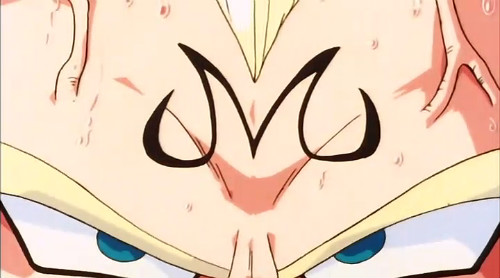
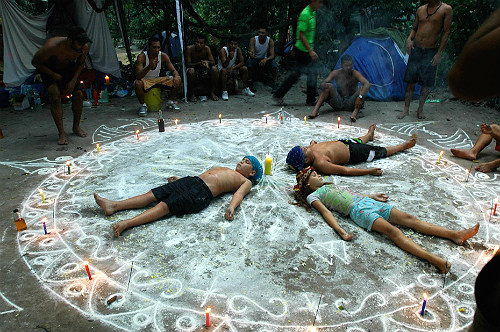
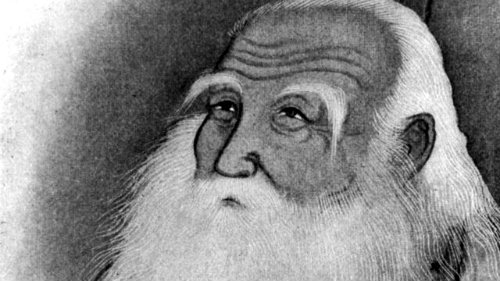
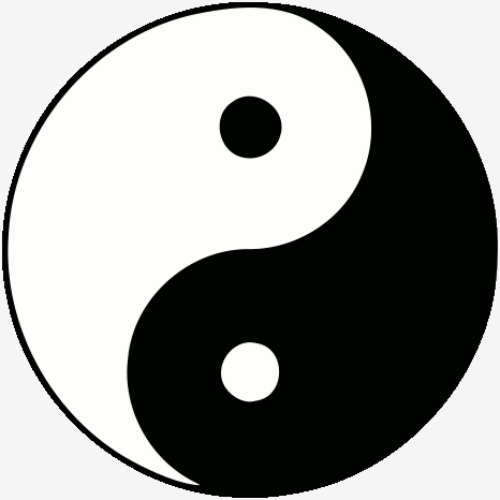
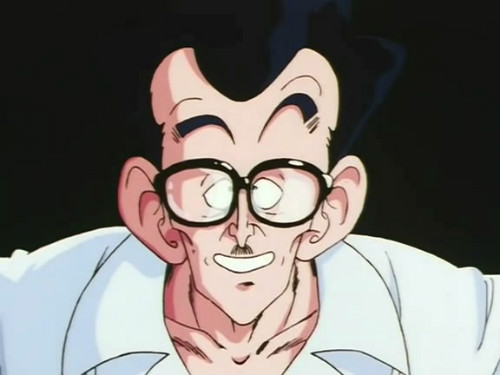
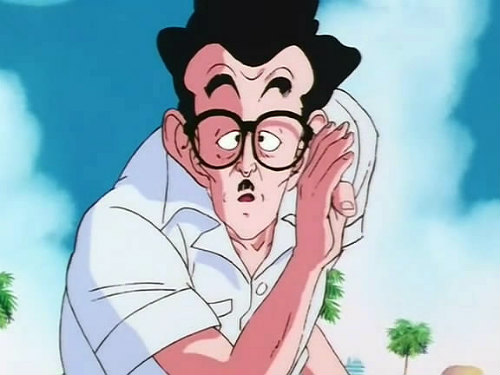
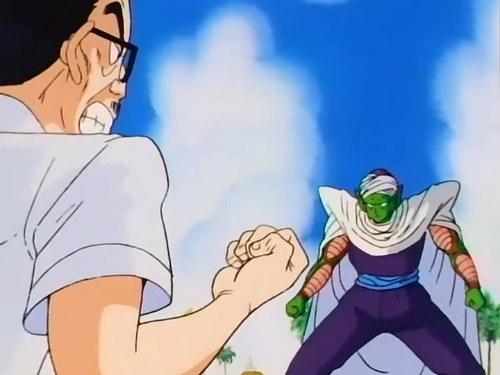
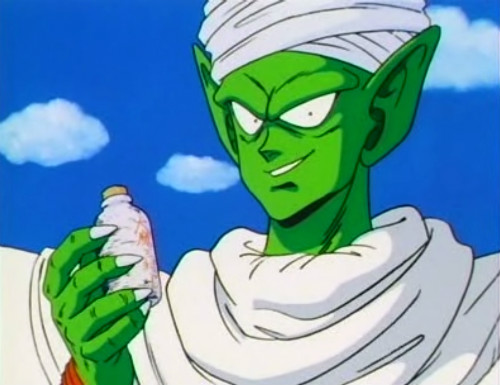
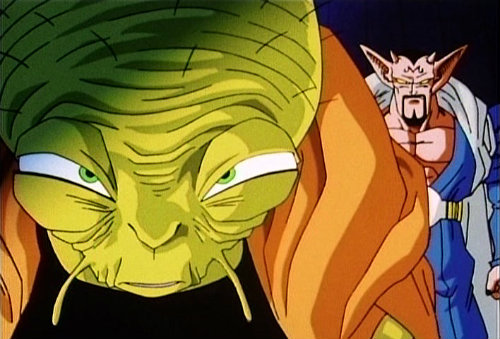
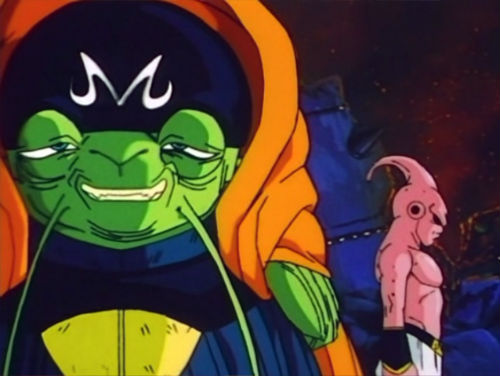
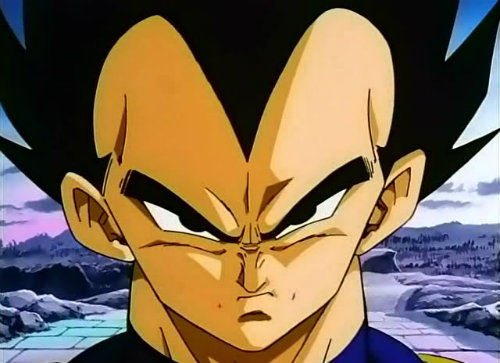
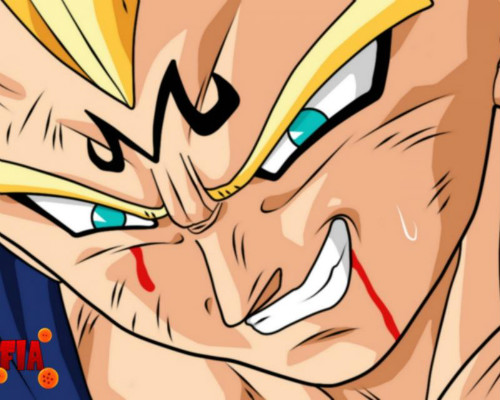
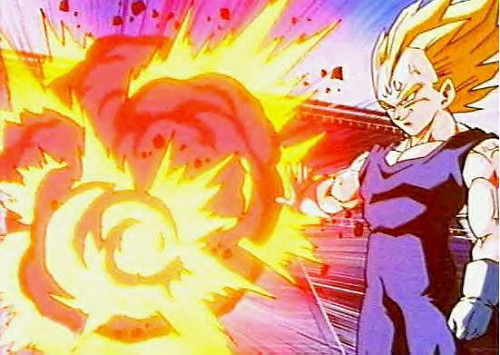
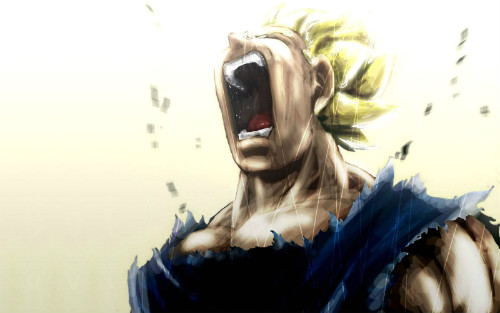
Great article! It’s a shame that the fight between SSJ2 Goku and Majin Vegeta was so short in the manga. Now that I think about it, if Vegeta hadn’t become a Majin then Buu may not have been released. All three Saiyans at the time were stronger than Dabura. If Gohan had failed then Goku or Vegeta could’ve killed Dabura and then Babidi. Of course that would’ve been a boring ending.
Thanks. Yeah, I think they would have done a fine job of defeating Dabura and Babidi all their own, despite Kaioshin’s protests to wait. I guess you’re only as strong as the weakest link in your chain, though, and Vegeta had a heart filled with desire and pride, so the story unfolded as it did. Worked out okay in the end, right? Of course without the Dragon Balls the entire universe would have been obliterated, so… yeah. Not so good.
That’s kind of poetic, actually. Vegeta’s actions led to Buu’s revival and the potential destruction of the universe, and Vegeta’s actions led to the salvation of the universe as he helped Goku defeat Buu. It started and ended with him.